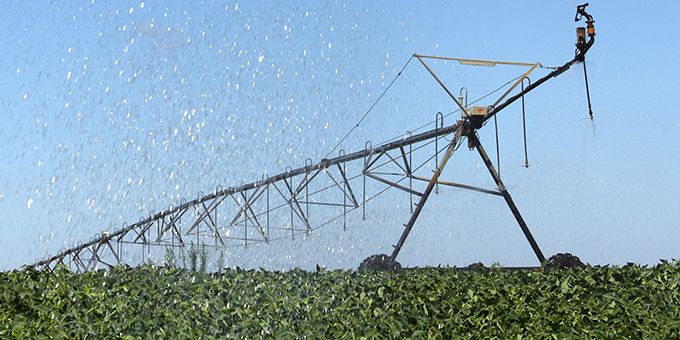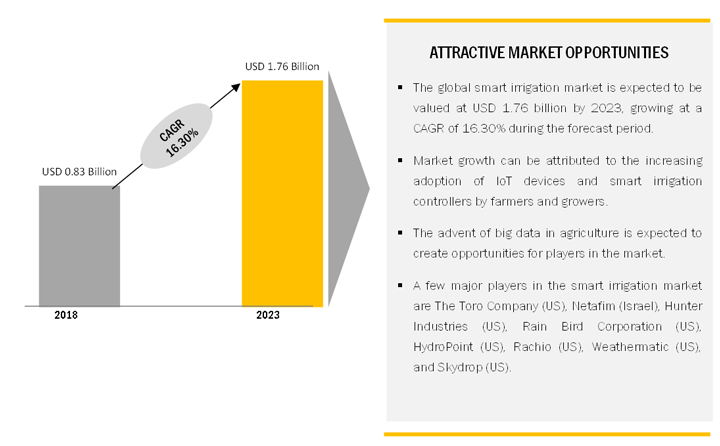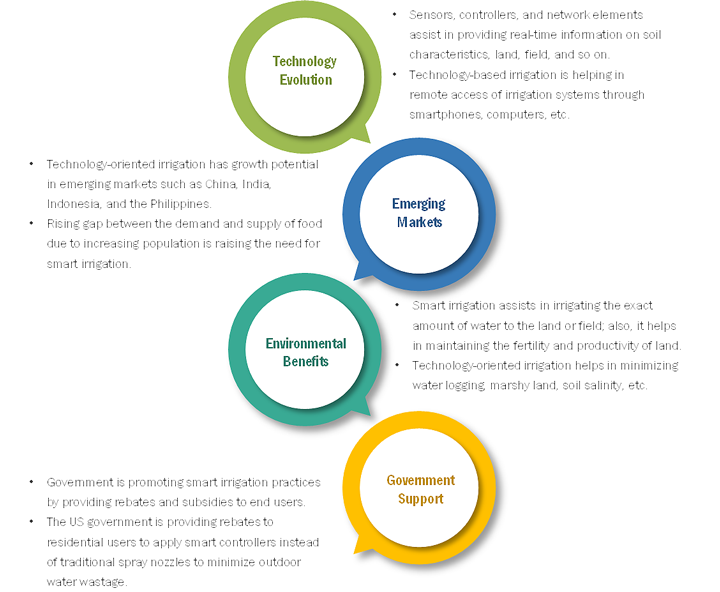The combination of the Internet of Things (IoT) and AI technologies, such as machine learning, computer vision, and predictive analytics, further allow farmers to analyse real-time data of weather conditions, temperature, soil moisture, and plant health.
 IoT–based Smart Irrigation Systems Transforming Irrigation Industry
IoT–based Smart Irrigation Systems Transforming Irrigation Industry

Report from | MarketsandMarkets™ INC.
The smart irrigation market is currently in the introductory growth phase and is expected to witness growth in the future owing to the increasing role of technology in irrigation management. The smart irrigation market was valued at USD 0.83 billion in 2018 and is expected to reach USD 1.76 billion by 2023, at a CAGR of 16.30% during the forecast period. Major factors contributing to the growth of the smart irrigation market include initiatives undertaken by various governments to promote water conservation, increasing adoption of smart irrigation controllers, and growing emphasis on increasing farm productivity and profits using smart irrigation solutions. However, the implementation of smart irrigation technologies in fragmented land and the lack of awareness related to smart irrigation among farmers restrain the smart irrigation market growth.

Increasing adoption of ICT-based decision support systems on the farm
ICT-based decision support systems, along with real-time data, can provide information covering all the aspects of farming at a granular level, which was not possible earlier. This enables improved decision-making, reduced water wastage, and increased efficiency at farms. With the help of smart controllers and sensors, farmers can ensure the supply of the right amount of water at right time in the farm. Smart irrigation comprises specialized hardware devices, software, and services used to obtain real-time data to help farmers make effective decisions pertaining to their farms.The combination of the Internet of Things (IoT) and Artificial Intelligence (AI) technologies, such as machine learning, computer vision, and predictive analytics, further allow farmers to analyse real-time data of weather conditions, temperature, soil moisture, and plant health.
Growth of smart cities and need for efficient irrigation systems
The growing importance of efficient watering practices and irrigation solutions for non-agricultural applications, such as residential, turf and landscape, and golf courses, is a major factor driving the growth of this market.Smart city is the ongoing trend across the major parts of the world. Smart cities focuses on the efficient management of water in commercial as well as residential spaces. The adoption of smart irrigation controllers is expected to increase exponentially in smart cities in coming years. Therefore, the growth of smart cities is expected to generate opportunities for players involved in the smart irrigation controller market. A few countries around the globe are characterized by extreme weather conditions. Irrigation systems in such regions need to be highly efficient. Smart irrigation systems with advanced soil and weather sensors can deliver high efficiency compared with conventional irrigation systems.

Americas to dominate the smartirrigation market
Americas accounts for a substantial share of the global smartirrigation market in 2018, wherein the US and Canada is considered to be the major contributors. The Americas accounted for a major share of ~47% of the smart irrigation market in 2018, and the same trend is expected to follow during the forecast period. The Americas held the largest market share owing to the early adoption of smart irrigation technologies by countries such as the US and Canada. The Americas has the highest number of smart irrigation systems installed at farms, residential landscapes, and golf courses. This region is home to several major players in the smart irrigation market; some of these are The Toro Company (US), Hunter Industries (US), Rain Bird Corporation (US), HydroPoint (US), Rachio (US), Banyan Water (US), and Rain Machine (US). These companies have contributed to the growth of the smart irrigation market in the Americas by launching innovative products and services and spending extensively on the R&D of smart irrigation technology.
Partnerships, agreements, mergers & acquisitions emerged as key growth strategies adopted by companies between 2016 and 2018
Major players, operating in the smart irrigation market, have adopted strategies such as acquisitions, partnerships, and product launches and developments to achieve the growth. For instance, HydroPoint acquired Baseline, Inc. (US), a smart irrigation technology provider, in 2016. This acquisition strengthened HydroPoint smart water management technology portfolio and also helped in expanding its geographic footprint. Moreover, the company launched a pressure-regulated body for rotors in January 2016. This new product would assist in minimizing the pressure of rotor to enhance efficiency and minimize water wastage. Some of the major players in the smart irrigation market are The Toro Company (US), Netafim (Israel), Hunter Industries (US), Rain Bird Corporation (US), HydroPoint (US), Rachio (US), Banyan Water (US), Rain Machine (US), ET Water (US), Galcon (Israel), Weathermatic (US), Blossom (US), Skydrop (US), Delta-T Devices (UK), Calsense (US), AquaSpy (US), Soil Scout (Finland), Caipos (Austria), Acclima (US), and Rain Machine (US).
Conclusion
Internet of Things (IoT)can play a vital role in increasing productivity of farm on per acre basis through site specific irrigation management. With the use of smart controllers, and sensors in farms and farming machineries, IoT-based smart irrigation offers real-time data and analytics, which enables farmers or growers to take corrective actions at right time. Hence, IoT is the most reliable approach for monitoring and predicting critical variables such as water quality, ambient temperature and moisture, and soil condition, which impacts the crop quality, yield, and the returns. Thus, IoT-based smart irrigation practice has the potential to transform the traditional irrigation method by making it more efficient and productive.
The content & opinions in this article are the author’s and do not necessarily represent the views of AgriTechTomorrow
Comments (0)
This post does not have any comments. Be the first to leave a comment below.
Featured Product

